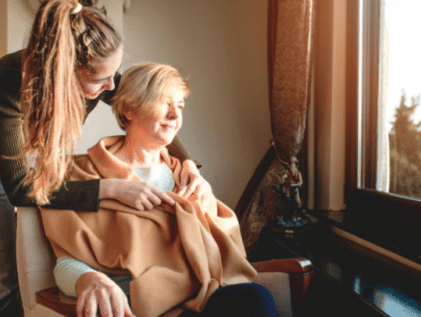As we all continue to live longer, some well beyond the average life expectancy of 78.7 years, more and more of us are facing the possibility of becoming primary caregivers for a parent or loved one. According to the National Alliance for Caregiving, nearly one in five Americans, primarily baby boomers and Gen X-ers, provide unpaid care to an adult. Additionally, 45% of family caregivers say they’ve experienced at least one financial impact due to caring for their loved one, and 22% say it’s made their health worse. Long-term caregiving is a massive responsibility that takes a toll on a caregiver’s mental and emotional health.
There are many different factors to consider before choosing to become a caregiver for a loved one. It is imperative that you, and anyone else joining you on this journey, can assess your availability, caregiving capabilities, and whether you’ll be able to provide adequate care to your loved one. Before becoming a caregiver, you’ll need to consider the following questions:
How will becoming a caregiver affect my finances?
Recent findings show that family caregivers spend about 20% of their income on caregiver costs. Unexpected costs such as increased household expenses, home modifications, and medical expenses can cause a considerable financial strain if you don’t plan appropriately.
Will becoming a caregiver affect my mental and emotional health?
Caregivers are often putting other’s needs ahead of their own. Caregiver burnout, a state of physical, emotional, and mental exhaustion, can be brought on by too much long-term stress, not enough support from others, a feeling of being spread too thin, and a drain on financial resources. Before becoming a caregiver, you’ll need to ensure that you have a support system to protect your mental and emotional health.
Will I need to hire additional help?
It is unrealistic to expect one or two family members to provide constant round-the-clock care for a loved one. You may need to consider hiring in-home help during the week to assist with activities of daily living or take advantage of respite care and temporary stays for when you need an extended break. If the role of caregiver becomes too overwhelming, it may be time to consider a senior living community.
How will becoming a caregiver affect my relationships?
Most caregivers have spouses, children, and other meaningful relationships that need to be nurtured after becoming caregivers. Maintaining healthy relationships with your family members can often take a backseat to the needs of your senior loved one. It is essential to consider whether you’ll be able to spend enough quality time with your family and how bringing a new person into the home will affect those dynamics.
Becoming a caregiver can be both challenging and rewarding. If you’re considering taking on the role of long-term caregiver for your loved one, be sure to seek help and advice from their medical team and other caregivers. There’s a lot to consider, but, in the end, you’ll need to make a decision that is beneficial for your loved one as well as you and your family members.

